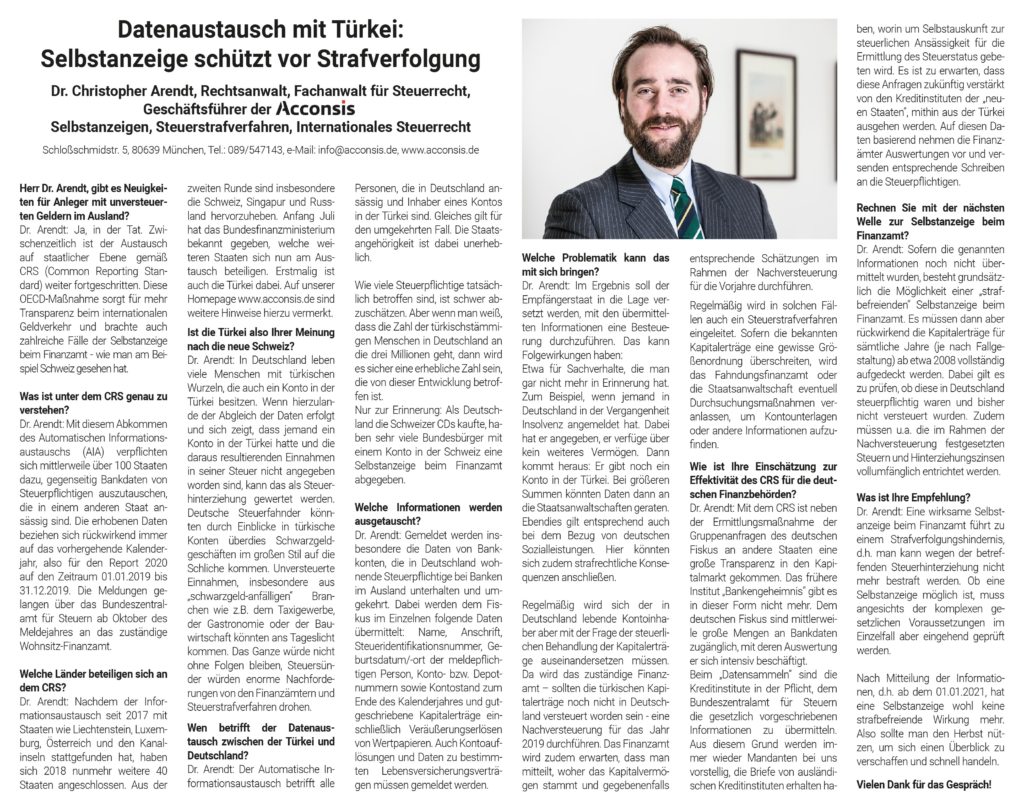In the middle of this year, the Federal Ministry of Finance declared that the Automatic Exchange of Information (AIA) will be expanded to include new countries from autumn 2020. The focus will be on data exchange with Turkey.
We have therefore asked Dr. Christopher Arendt, attorney, tax law specialist and managing director of ACCONSIS in Munich, for an interview.
What does that mean concretely?
Data exchange with Turkey: voluntary disclosure protects against prosecution
Dr. Arendt, is there any news for investors with untaxed money abroad?
Yes, indeed.
In the meantime, the exchange at the state level in accordance with the CRS (Common Reporting Standard) is more advanced. This OECD measure ensures greater transparency in international money transactions and has also resulted in numerous cases of voluntary disclosure to the tax authorities – as has been seen in the example with Switzerland.
What exactly is the CRS?
With this Automatic Exchange of Information Agreement (AIA), more than 100 countries are now committed to exchanging bank data of taxpayers resident in another country. The data collected always relate retroactively to the previous calendar year, i.e. for the 2020 report to the period from 01.01.2019 to 31.12.2019. The reports are sent via the Federal Central Tax Office to the competent tax office of the country of residence from October of the reporting year.
Which countries participate in the CRS?
After the exchange of information since 2017 with countries such as Liechtenstein, Luxembourg, Austria and the Channel Islands, another 40 countries have now joined in 2018. Of the second round, Switzerland, Singapore and Russia are particularly noteworthy. At the beginning of July, the Federal Ministry of Finance announced which other states are now participating in the exchange. Turkey is also participating for the first time.
So is Turkey the new Switzerland in your opinion?
Many people with Turkish roots live in Germany and also have a bank account in Turkey. If the data is compared in this country and it turns out that someone had an account in Turkey and the resulting income was not declared in his tax return, this can be considered tax evasion. German tax investigators could come by views of Turkish accounts beyond that black money business on a large scale on the sniffs. Untaxed income, especially from “black money-prone” industries such as cab, gastronomy or the construction industry could come to light. The whole thing would not remain without consequences, tax evaders would be threatened with enormous additional demands from the tax offices and criminal tax proceedings.
Who is affected by the data exchange between Turkey and Germany?
The automatic information exchange concerns all persons who are resident in Germany and have an account in Turkey. The same applies to the reverse case. The nationality is irrelevant.
In my opinion, it is difficult to estimate how many taxpayers are actually affected. But if you know that the number of people of Turkish origin in Germany is around three million, then it will certainly be a considerable number that is affected by this development.
Just to remind you: When Germany bought the Swiss CDs, a great many German citizens with an account in Switzerland filed a voluntary declaration with the tax office.
What information is exchanged?
In particular, the data of bank accounts held by taxpayers resident in Germany with banks abroad and vice versa are reported. The following data are transmitted to the tax authorities: Name, address, tax identification number, date/place of birth of the person subject to reporting, account or securities account numbers as well as account balance at the end of the calendar year and credited investment income including proceeds from the sale of securities. Account closures and data on certain life insurance contracts must also be reported.
What problems can this cause?
As a result, the recipient state should be enabled to tax the transferred information. This can have consequences:
For example, for facts that are no longer remembered. For example, if someone in Germany has filed for insolvency in the past. In doing so, they have stated that they have no other assets. Then it comes out: he still has an account in Turkey. With larger sums data could then come to the public prosecutor’s offices. The same applies accordingly to the receipt of German social benefits. This could also have consequences under criminal law.
However, account holders living in Germany will regularly have to deal with the question of the tax treatment of investment income. The responsible tax office – if the Turkish investment income has not yet been taxed in Germany – will carry out a subsequent taxation for the year 2019. The tax office will also expect to be informed of the origin of the capital assets and, if necessary, to make corresponding estimates within the scope of the subsequent taxation for previous years.
Criminal tax proceedings are also regularly initiated in such cases. If the known investment income exceeds a certain level, the investigating tax office or the public prosecutor’s office may initiate search measures to locate account documents or other information.
What is your assessment of the effectiveness of the CRS for the German tax authorities?
The CRS has brought a high degree of transparency to the capital market, in addition to the investigative measure of group inquiries by the German tax authorities to other countries. The former “banking secrecy” institution no longer exists in this form. The German tax authorities now have access to large amounts of bank data, and are working intensively on evaluating them.
When “collecting data”, the credit institutions are obliged to provide the Federal Central Tax Office with the information required by law. For this reason, clients who have received letters from foreign credit institutions requesting information on their tax domicile for the purpose of determining their tax status are frequently approached by us. It is to be expected that in the future these requests will increasingly come from the credit institutions of the “new states”, i.e. from Turkey. Based on this data, the tax offices will carry out evaluations and send corresponding letters to the taxpayers.
Data exchange with Turkey: So are you expecting the next wave of self-denunciation with the tax authorities?
If the above-mentioned information has not yet been provided, there is always the possibility of a “penalty-exempt” voluntary declaration to the tax office. In this case, however, the investment income for all years (depending on the case) from around 2008 onwards must be disclosed in full retroactively. It is necessary to check whether this income was taxable in Germany and has not been taxed so far. In addition, the taxes and evasion interest determined within the scope of the subsequent taxation must be paid in full.
Many thanks for the interview!
Data exchange with Turkey?
Our expert advises:

Rechtsanwalt
Fachanwalt für Steuerrecht
Geschäftsführer der ACCONSIS
Dr. Christopher Arendt
Selbstanzeigen
Steuerstrafverfahren
Internationales Steuerrecht
Service-Phone
+ 49 89 547143
or by e-mail c.arendt@acconsis.de
My recommendation?
An effective self-denunciation at the tax office leads to an obstacle to prosecution, i.e. one can no longer be punished for the tax evasion in question.
However, whether a self-denunciation is possible must be examined in detail in each individual case in view of the complex legal requirements.
Once the information has been provided, a voluntary disclosure will probably no longer have an exempting effect, i.e. from 01.01.2021. So one should use the time until the end of the year to get an overview and act quickly.
Please do not hesitate to contact me.
I will be happy to assist you with advice.

Further mentions in press releases for information exchange Turkey
Time schedule for implementation of the Common Reporting Standard
According to the OECD list, Status of Commitments,
Status: 16.09.2020, the intended exchange of information should take place by September 2020 at the latest for the following countries:
Anguilla, Argentina, Belgium, Bermuda, British Virgin Islands, Bulgaria, Cayman Islands, Colombia, Croatia, Cyprus, Czech Republic, Denmark, Estonia, Faroe Islands, Finland, France, Germany, Gibraltar, Greece, Guernsey, Hungary, Iceland, India, Ireland, Isle of Man, Italy, Jersey, Korea, Latvia, Liechtenstein, Lithuania, Luxembourg, Malta, Mexico, Montserrat, Netherlands, Norway, Poland, Portugal, Romania, San Marino, Seychelles, Slovak Republic, Slovenia, South Africa, Spain, Sweden, Turks and Caicos Islands, United Kingdom, Andorra, Antigua and Barbuda, Aruba, Australia, Austria, Azerbaijan, Bahamas, Bahrain, Barbados, Belize, Brazil, Brunei Darussalam, Canada, Chile, China Cook Islands, Costa Rica, Curaçao, Dominica, Greenland, Grenada, Hong Kong (China), Indonesia, Israel, Japan, Lebanon, Macao (China), Malaysia, Marshall Islands, Mauritius, Monaco, Nauru, New Zealand, Niue, Pakistan, Panama, Qatar, Russia, St. Petersburg, St. Petersburg, St. Petersburg, St. Petersburg, St. Petersburg. Kitts and Nevis, St. Lucia, St. Vincent and the Grenadines, Samoa, Saudi Arabia, Singapore, Sint Maarten, Switzerland, Trinidad and Tobago, Turkey, United Arab Emirates, Uruguay, Vanuatu, Ghana, Kuwait, Kazakhstan, Nigeria, Oman, Peru
Bundeszentralamt für Steuern,
Aktuelle Liste der teilnehmenden Staaten
Stand: 1. Juli 2020

